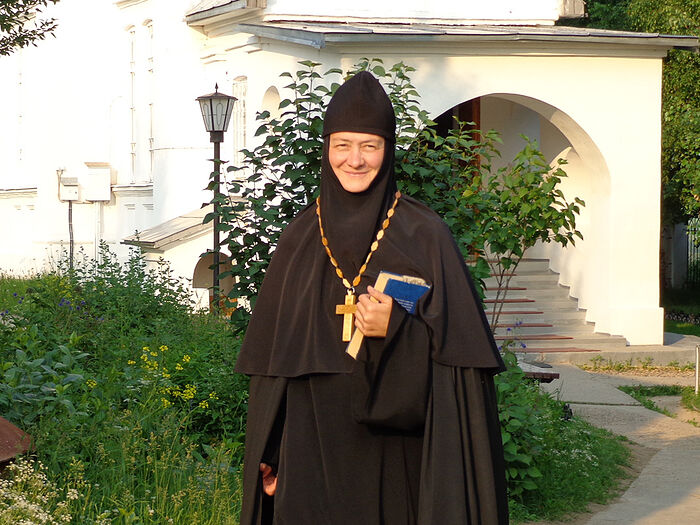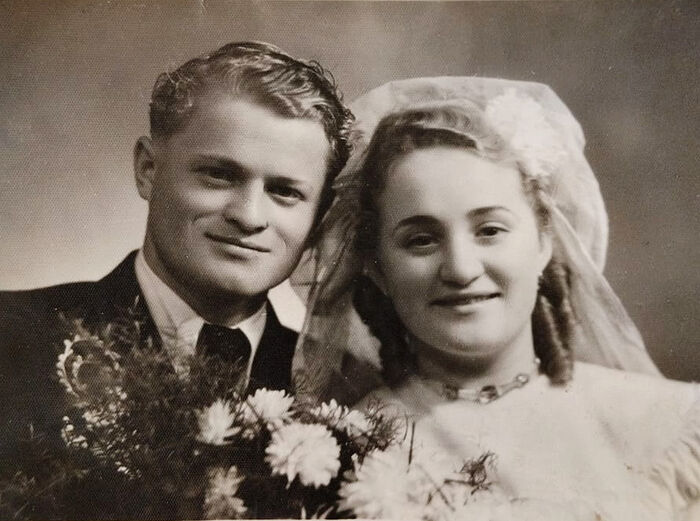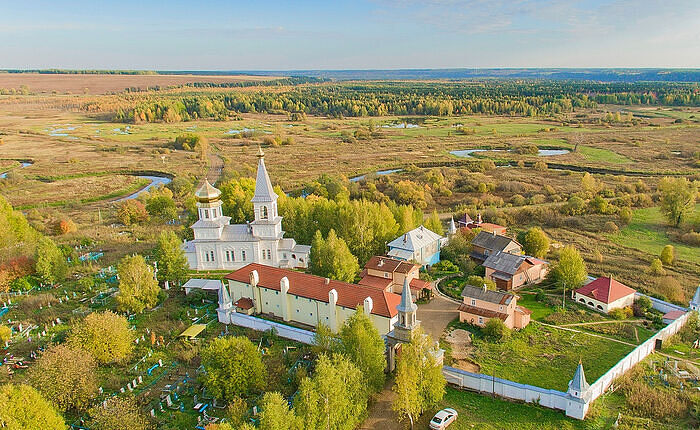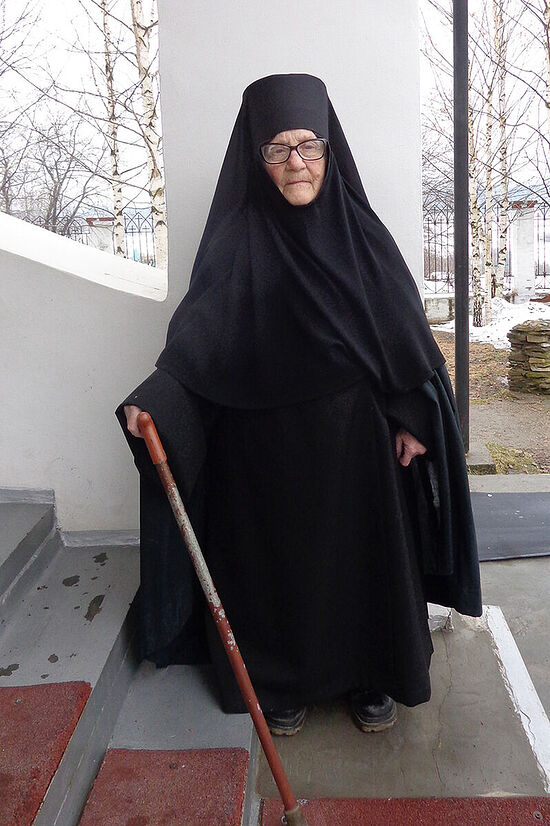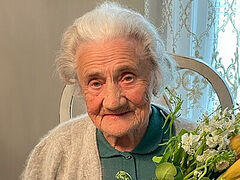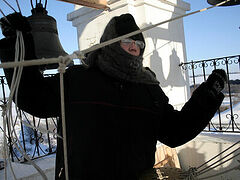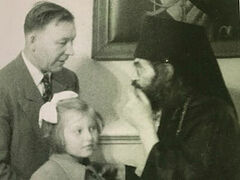Her fate was about to be decided
In 1950, a beautiful blonde girl of eighteen years old went to the Kazan-Theotokos Monastery in Harbin. The old gatekeeper monk just watched her go in without stopping her: A service was about to start in the monastery church, and all lay parishioners and pilgrims were allowed in. However, the girl didn’t hurry to the church, but turned to the gatekeeper and said:
“Excuse me, how can I find Elder Ignaty?”
The monk looked closely at the girl: She was short, but not timid, rather nimble. She was dressed in a gray cotton dress with a white apron and pelerine, and on her head was a white novice’s headdress.
“I see, young lady, that you’ve come to us from the St. Olga Orphanage at the Vladimir Monastery?”
“Yes, I’m from there…”
“Then you’re an orphan… So little… And not afraid to roam around Harbin alone…”
“I’d like to see Batiushka Ignaty. They say he’s clairvoyant…”
“Go that way, my dear, straight along this path, and you’ll see the brothers’ building. There’s an entrance to the basement, and a line of pilgrims near it—you’ll find our Fr. Ignaty there.”
The girl went along the path the monk had showed her, her heart beating like a frightened rabbit: Her fate was about to be decided.
Harbin Elder
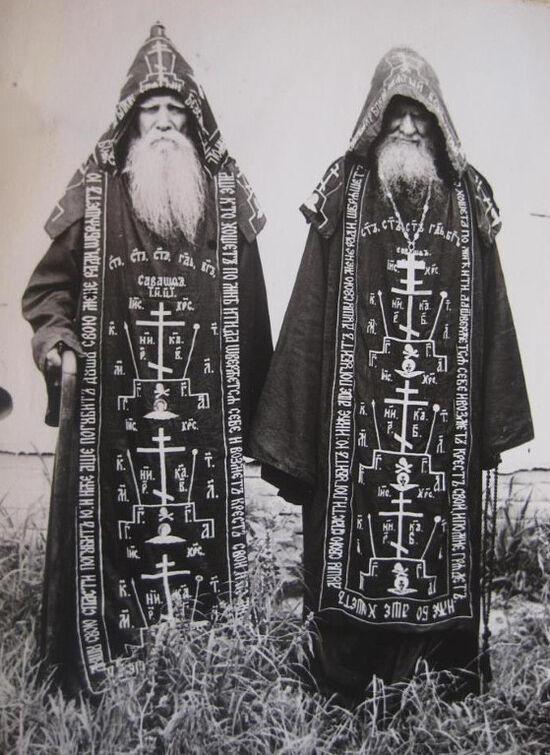 Schemamonk Tryphon and Schema-Igumen Ignaty (Melekhin) (left) at the Kazan-Theotokos Monastery in Harbin
Schemamonk Tryphon and Schema-Igumen Ignaty (Melekhin) (left) at the Kazan-Theotokos Monastery in Harbin
Schema-Igumen Ignaty (Melekhin) was truly clairvoyant, and his life was amazing. He was born in 1865. He fell seriously ill in his youth and made a vow that if he got better, he’d go to a monastery. Thus he ended up in the monastery.
He came to Harbin with the White Army units in 1922, being then a hieromonk. He entered the Kazan-Theotokos Monastery, served many years at the altar of God, pastored the flock, was elevated to the rank of igumen, and became one of the most revered pastors in the city.
In the forties, when he was already in his late seventies, he went blind, but that only sharpened his spiritual vision. He could no longer serve at the altar of God and celebrate the Liturgy, but he continued to hear Confessions and comfort the people. Having no physical vision, Fr. Ignaty saw with spiritual eyes not only the penitent himself, but also his soul. The remarks he made often had an amazing effect on a person, since Fr. Ignaty answered even thoughts that weren’t expressed to him.
Sometimes he served brief molebens and then read the Gospel from memory. Early in the morning, he could be seen in the monastery enclosure feeding pigeons sitting on his shoulders and arms.
In the fifties, Fr. Ignaty fell seriously ill and being near death, he was tonsured in the schema. After his tonsure, he recovered and continued helping people. He became known to Harbin residents and all Russians in China as an elder who had acquired the spiritual gifts of fervent faith, unceasing prayer, clairvoyance, healing of the sick, and consolation of the suffering.
Elena, my child, help me, an old man!
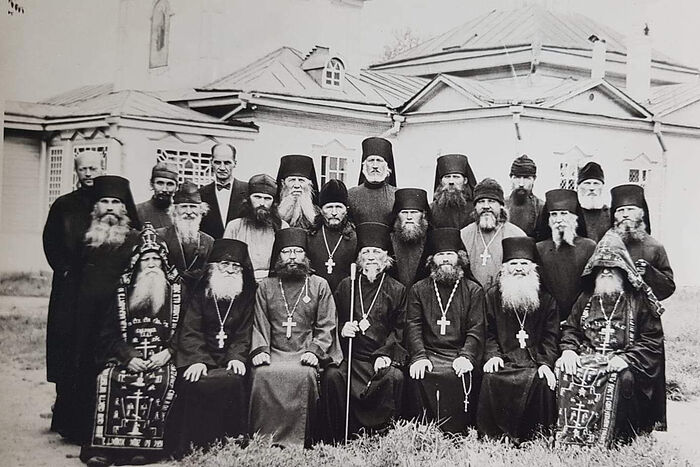 The brethren of the Kazan-Theotokos Monastery in 1945 in Harbin. Fr. Ignaty is on the far left in the first row. In the center is Bishop Juvevanly (Kilin), abbot of the monastery
The brethren of the Kazan-Theotokos Monastery in 1945 in Harbin. Fr. Ignaty is on the far left in the first row. In the center is Bishop Juvevanly (Kilin), abbot of the monastery
The savvy girl quickly found the Elder’s cell she was looking for. The pilgrims waiting for him were standing nearby. The door to the basement cell was ajar, and cold air was blowing out. The women were talking amongst themselves:
“How cold it is in Batiushka Ignaty’s cell!”
“Why don’t they move him to a warm cell? He’s already old and sick!”
An elderly gray-haired pilgrim intervened in the women’s lamentations:
“Be quiet, you magpies! The Elder himself doesn’t want that! The abbot suggested to him to move into the brothers’ quarters a long time ago, but he refuses.”
“But why?”
“He’s dissuaded by his foot disease. He says it’s hard to climb up to the high veranda. And the brethren think that the Elder labors this way, voluntarily enduring the cold…”
The monastery bell was struck.
“Batiushka’s coming, he’s coming”—a wave swept through the pilgrims, and indeed, out of the basement cell came Elder Ignaty, leaning on his cane.
The orphan-novice looked at him intently: Despite his eighty-five years and blindness, the Elder impressed people with his tall stature and majesty. His face was covered by his schema. The pilgrims rushed to him, waiting to see whom Fr. Ignaty would choose to help him get to church. Without a doubt, he could have done it himself, but he always chose a helper, apparently seeing with spiritual vision who needed his counsel most of all. This morning he gently called:
“Elena, my child, help me, an old man!”
The young novice didn’t even realize at first that the Elder was addressing her. The pilgrims exclaimed:
“What’s with you?! Go! Don’t you see that he’s calling you?!”
How did he know her name?! Elena rushed to the Elder, gently took him by the arm, and the two figures—tall and majestic, and small and fragile—quietly plodded towards the church, accompanied by the sighs of the faithful:
– Oh, you lucky girl!
“Apparently she needs it…”
Talking with the Elder
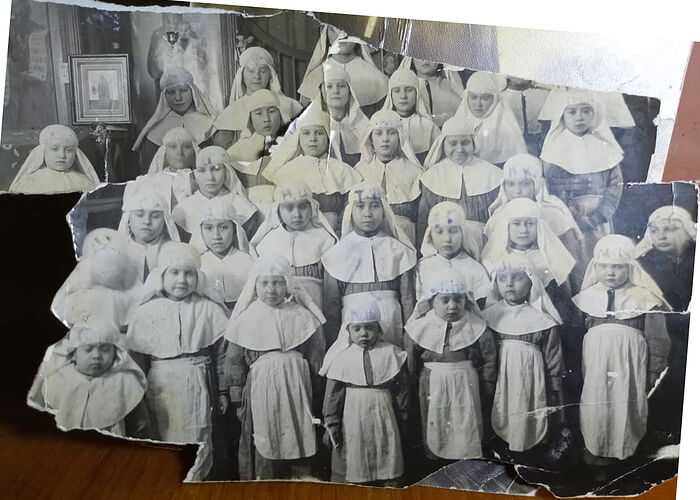 Wards of the St. Olga orphanage. Elena is on the far left, where the photo is torn off
Wards of the St. Olga orphanage. Elena is on the far left, where the photo is torn off
Meanwhile, the Elder was slowly talking with the girl:
“Why did you come, my child? Is it really so bad living in the Theotokos-Vladimir Monastery? I mean, you’ve been living there for a long time…”
But Elena was in a hurry: She had to make sure to say everything that was in her soul:
“Yes, Batiushka Ignaty, I’ve been there a long time! My father came to these parts before the revolution. He was an engineer for the Chinese-Eastern Railway. I have two sisters, Tanya and Zhenya. When I was six, our mother died, and it was hard for my father to be alone with three daughters, and there was no one to watch after us when he went to work… Our Godmother Zinaida asked the St. Olga Orphanage at the monastery to take us, and Abbess Ariadna (Michurina) took us.”
“And how do you like living there?”
“Thank God, Batiushka, it’s good! First our father went to war, then he was in a Chinese prison for suspicion in connection with the Soviets. Zhenechka, our younger sister, was already adopted a long time ago, but Tanya and I have spent all these years at the orphanage. The sisters of the monastery teach us, they feed us, they take care of us. They try to give us a good education.”
“You’re not starving?”
“Well, Batiusha, the nuns themselves live a little sparsely, but they share with all of us. You could say they give us the best bites…”
“You probably gather apples and nuts to feed yourself,” the Elder said smiling, and Elena was as if enveloped with a warm wave. Her eyes stung—Fr. Ignaty hadn’t said anything special to her, but she felt like it was her own loving father talking with her.
“Yes, Batiushka! Next to our orphanage there’s a cemetery, where we have apple and hazel trees, and we like to feed ourselves there, just like you said.”
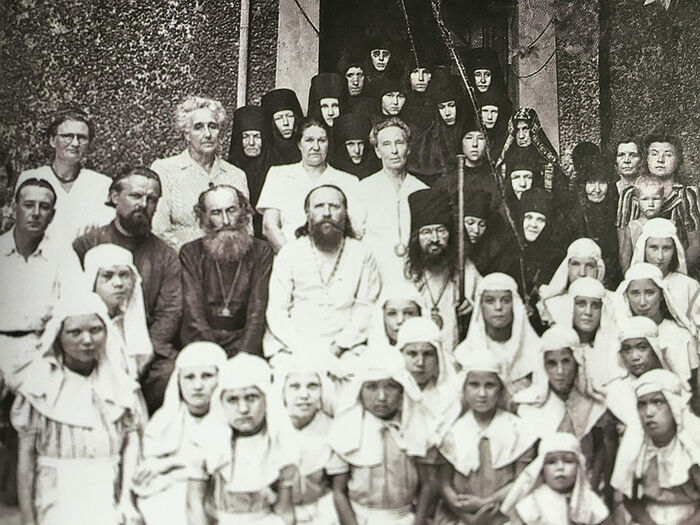 St. John of San Francisco with the nuns of the Theotokos-Vladimir Monastery, Abbess Ariadna (Michurina), clergy, and the wards of the St. Olga Orphanage
St. John of San Francisco with the nuns of the Theotokos-Vladimir Monastery, Abbess Ariadna (Michurina), clergy, and the wards of the St. Olga Orphanage
“And you have an angelic voice, Elena! The Lord Himself has blessed you to sing and read on the kliros.”
“Yes, Batiushka, I sing and read. It’s just that nuns often reproach me for being too frisky and nimble. And now that I’m eighteen, it’s time for me to leave the orphanage. The sisters don’t force the wards—if you want to, you can stay in the monastery; if you want to, you can go into the world. So I wanted to find out from you, dear Batiushka, the will of God for me: the world or the monastery.”
“And what do you want, my daughter?”
“Life in the world beckons me, Batiushka! Freedom! I want to get married too… What kind of nun would I be?!”
“The Lord doesn’t force anyone, Elenochka. He doesn’t act that way, laying just one path out before someone. There are many paths before all of us. So choose whichever one your heart inclines towards. But you’ll end up in a monastery in due time anyway!”
The ways of the Lord are inscrutable
After leaving the orphanage, Elena Konstantinovna Mokienko moved in with her Godmother Zinaid and got a job serving as a messenger at the telegraph office. Two years later, she got married to Dmitry Zabrodin, and a few years later they moved to Russia.
Amazingly, they wound up in the Perm Region, precisely where the founders of the Harbin Theotokos-Vladimir Monastery and St. Olga Orphanage—Abbess Rufina (Kokoreva; 1872–1937) and her spiritual daughter, Abbess Ariadna (Michurina; 1900-1996)—began their monastic path.
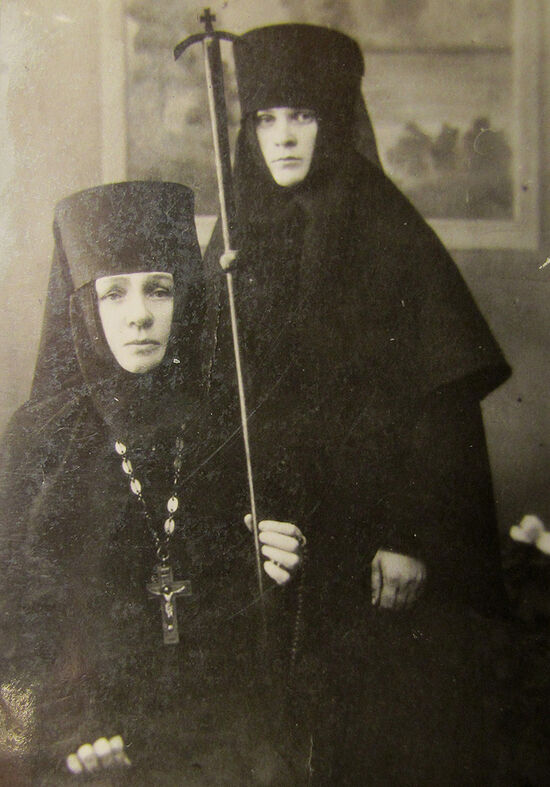 Abbess Rufina (Kokoreva) and her spiritual daughter, Nun Ariadna (Michurina)
Abbess Rufina (Kokoreva) and her spiritual daughter, Nun Ariadna (Michurina)
The Zabrodins settled in Berezniki, and they had four children: two sons and two daughters. Elena and Dmitry worked at various enterprises and in different specialties. Her husband worked in an “unhealthy” industry, fell ill, and this disease brought him to his end. Elena was widowed at the age of fifty, when her younger daughter was just sixteen.
During the life of her husband, Elena always went to church. She went to the village of Orel, to the Church of the Salutations to the Most Holy Theotokos. And then the Church of the Beheading of St. John the Forerunner was opened in Berezniki. Elena also went to Chusovskie Gorodki to Archpriest Nikolai Rogozin, who was greatly revered in the Urals. When she was widowed, she became a constant and active participant in the Church services. She was well versed in the liturgical typicon, read loudly and clearly, and had a good singing voice.
For many years, Elena went to our Kazan-St. Tryphon Convent in Verkhnechusovskie Gorodki and confessed to our spiritual father, Igumen Savvaty (Rudakov). In one of her conversations with Fr. Savvaty, she spoke about her youth, about how in Harbin the clairvoyant Elder Ignaty foretold her monasticism.
Elena said about herself:
“When I read books about monasteries, there’s such a thrill in my soul! Even to the point of tears! Apparently the Lord is calling me to repentance, so that I would finish my life path as I started it…”
How authoritatively the providence of God works in a man’s life, and how it’s revealed to the chosen of God
In Great Lent, on April 6, 2016, our spiritual father, Igumen Savvaty tonsured Elena as a nun with the name Julia, in honor of the holy Martyr Julia of Ancrya (of Corinth, celebrated May 31). Mother Julia labored in monasticism for four years, and in 2020, at the age of eighty-eight, she departed to the Lord.
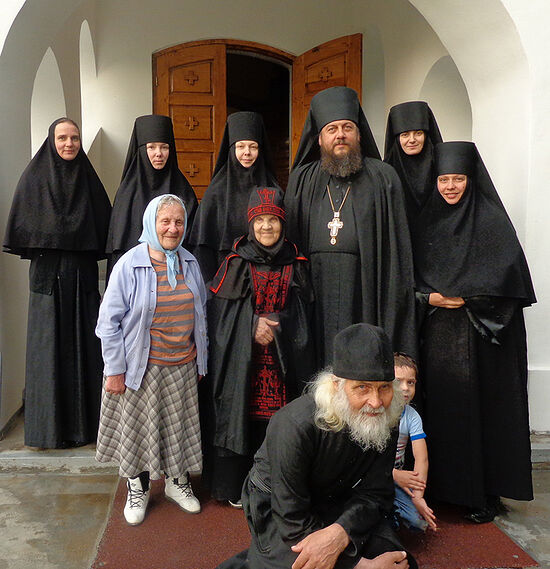 Elena before her tonsure, in a blue kerchief with the sisters of the Kazan-St. Tryphon Hermitage and the spiritual father of the monastery, Igumen Savvaty
Elena before her tonsure, in a blue kerchief with the sisters of the Kazan-St. Tryphon Hermitage and the spiritual father of the monastery, Igumen Savvaty
For the sisters of our Kazan-St. Tryphon Hermitage, the life of Nun Julia was a testimony of how inscrutable are the ways of the Lord, how authoritatively the providence of God acts in a man’s life, and how it’s revealed to God’s chosen ones—such as the Elder Schema-Igumen Ignaty (1865–1958).
The Lord also revealed to the sisters of our monastery a spiritual connection with the ascetics who began their monastic path in the Perm Governorate—Abbess Rufina and Abbess Ariadna. And this connection was mystically accomplished through their ward Elena, who grew up under their spiritual patronage in the orphanage in faraway Harbin and took monastic vows in the monastery in the Perm Region at the end of her life.

